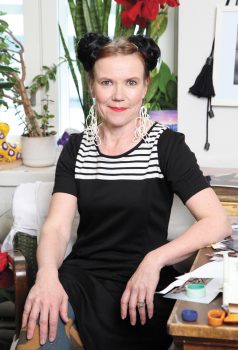Tag: Russia
Alpo Rusi: Etupiirin ote [The grip of the sphere of influence]
4 May 2015 | Mini reviews, Reviews
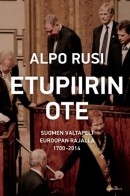 Alpo Rusi
Alpo Rusi
Etupiirin ote [The grip of the sphere of influence]
Helsinki: Gummerus, 2014. 411p.
ISBN 978-951-20-9715-9
€34.90, hardback
In his work Etupiirin ote, the scholar, writer and former ambassador Alpo Rusi provides an interesting and polemical analysis of Finland’s foreign and security policies, particularly with regard to its neighbour, Russia / the Soviet Union. His premise is that from the 18th century onward Finland has, sometimes more broadly, sometimes more narrowly, formed part of the Russian sphere of influence. He gives a brief account of the end of the period of Swedish rule (until 1809) and that of Russian rule (1809-1917), as well as of the early decades of Finnish independence. The main emphasis of the book is on the period beginning with the Second World War. Rusi has a personal perspective on much recent history. He bases his evaluations on many diverse, sometimes controversial, sources and expresses strong opinions in his account, for example, of ‘Finlandisation’, Soviet influence on Finnish politics with its negative side effects. Rusi strongly criticises decision-makers who, as late as the 1980s and 1990s, believed in the desirability of trade with the east and the permanence of the Soviet Union, despite signals to the contrary. Following the collapse of the Soviet Union, Finland joined the European Union, but even as a member its attitudes towards, for example, Nato and Russia, have been problematic in many ways. Rusi ends his book on the theme of the Ukraine crisis, presenting his own proposal for the development of foreign and security policies.
Timo Vihavainen: Ryssäviha. Venäjän-pelon historia [Ryssäviha. A history of Russophobia in Finland]
10 April 2014 | Mini reviews, Reviews
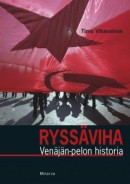 Ryssäviha. Venäjän-pelon historia
Ryssäviha. Venäjän-pelon historia
[Ryssäviha. A history of Russophobia in Finland]
Helsinki: Minerva Kustannus Oy, 2013. 322 pp.
ISBN 978-952-492-778-9
€31.90, hardback
In this well-written polemical study Professor Timo Vihavainen examines Russophobia mainly from a Finnish point of view, but also in a European context. He also writes about the reverse phenomenon, the emergence in Russia of xenophobia and accusations of ‘Russophobia’ among neighbouring countries. In 20th-century Europe it was more a question of opposition to the Soviet Union and its ideological system than of Russophobia as such. During the late 19th century Finland, which had been part of Russia from 1809 to 1917, saw the rise of so-called ryssäviha, ‘Russia-hate’, which began in the period of Russification and increased during the Civil War of 1917–1918. Between the World Wars it persisted especially in Akateeminen Karjala-Seura (‘The Academic Karelia Society’), a right-wing student organisation, and was fuelled by reports of political terror from across the eastern border, though even then a significant part of Finland’s working class saw the Soviet Union in a favourable light. During the Second World War ryssäviha came to a head in response to a conflict perceived as unjust, and to territorial concessions. In the 1960s, partly for political reasons, anti-Soviet sentiment became replaced by pro-Soviet attitude. Since the break-up of the Soviet Union in the 1990s relations with Russia have largely been free of problems.
Translated by David McDuff
What does the neighbour think?
26 April 2013 | Essays, Non-fiction
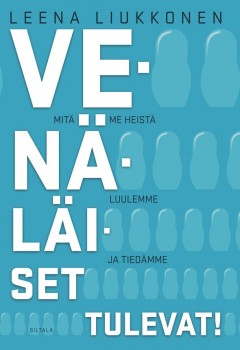 For more than 20 years journalist Leena Liukkonen has been thoroughly involved with Russian culture, commerce, language and psyche. The subtitle of her new book of essays Venäläiset tulevat! (‘The Russians are coming!’) is ‘What we think and know about them’, and refers to the fact that the Finns do not really know their eastern neighbours very well. Liukkonen writes with insight about the differences in history, mentality and world view
For more than 20 years journalist Leena Liukkonen has been thoroughly involved with Russian culture, commerce, language and psyche. The subtitle of her new book of essays Venäläiset tulevat! (‘The Russians are coming!’) is ‘What we think and know about them’, and refers to the fact that the Finns do not really know their eastern neighbours very well. Liukkonen writes with insight about the differences in history, mentality and world view
Extracts (under original subtitles) from Venäläiset tulevat! Mitä me heistä luulemme ja tiedämme (Siltala, 2013)
WAR, REMEMBERING AND FORGETTING
In café conversations with other visitors to Russia, we often react with exasperation to the fact that discussions in Finland only ever start with the Winter War. Sometimes we wonder why the threshold between us and our neighbour to the east is still so high. My own living contact with the past, however, makes it clear to me that everything the elderly carry round with them could not have been simply shaken off with the passage of time. Nor can the next generation just break away from it. My own experience also reminds me how distant our eastern neighbour was during peacetime. After all, a very few have made the long journey to the country next door. To many people, the old story was the only story there was about Russia. More…
Keeping up with the Joneskis
17 April 2009 | Extracts, Non-fiction
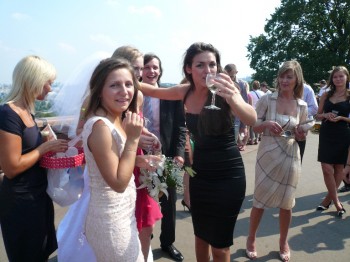
Toasting the bride: cheerful wedding parties drive up to the Sparrow Hills in Moscow in summer
Moscow-based journalist Anna-Lena Laurén finds the new Russia a promised land of materialism – a place where appearances are everything, and how you pay for maintaining them is a matter of strictly secondary interest
‘I want to go to the nightclub by boat! Come on, let’s hire one,’ Ilya says, heading towards the shore where a boat for at least twenty people is moored. There are six of us.
After two minutes of negotiation, he takes up his position alongside the gangway. He welcomes us onboard with a chivalrous gesture. We step onto the boat and are gently taken off down the Moyka canal in the white night of St Petersburg in June. The sky is pale pink and dark blue-lilac, the air damp and cold, but the captain hands out rugs to keep us warm. The ornamented bridges and pastel-coloured façades of St Petersburg glide past in a faint glow, it’s just light enough to make out the colours, powdery pink, vanilla yellow, pale blue. More…
A toast before dying
Issue 2/2005 | Archives online, Fiction, Prose
Extracts from the novel Voin jo paljon paremmin. Tšehov Badenweilerissa (‘I already feel much better. Chekhov in Badenweiler’, Loki, 2004). Introduction by Hannu Marttila
I went to meet them Friday and I did not plan to take other patients that week. They had a small but comfortable room with striped wallpaper.
The Russian was a tall man, but stooped. It soon became apparent that his wife spoke fluent German because she was of German descent. That made it much easier to take care of things.
Of course I knew who the patient was. I have always enjoyed literature and other forms of art. I could play several pieces rather well on the piano. When I was younger I had even written a couple of stories set in the mountains, though I had never offered them for publication. As for Chekhov, I had read a couple of his stories that had just come out in German translation, and I had liked them quite a lot in a way, even though they of course reflected that characteristic Russian nature, with its vodka and untidiness.
The patient’s wife seized both my hands when I entered. It was a bit confusing, but not necessarily unpleasant.
‘Our name is Chekhov. We have come from Russia,’ the woman said in a strong, carrying voice. ‘I trust you’ve been told?’ More…

